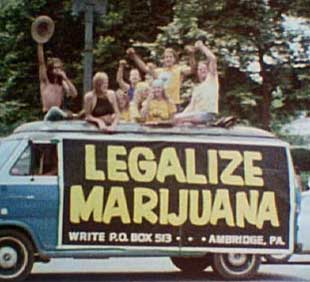Support is growing to bring sanctioned control and regulation to a market where none exists now.
July 15, 2009 – Dan Neil hits the nail on the head (“” July 7). The relatively minor  negative consequences that Olympic swimming champion Michael Phelps had to endure for being outed for his marijuana use is Exhibit A that the war on marijuana is coming to an end. The American people are tired of the hypocrisy and extremism inherent in the war on (some) drugs.
negative consequences that Olympic swimming champion Michael Phelps had to endure for being outed for his marijuana use is Exhibit A that the war on marijuana is coming to an end. The American people are tired of the hypocrisy and extremism inherent in the war on (some) drugs.
In a 1969 Gallup poll, only 12% of Americans supported making marijuana legal. By 2005, support had grown to 36%. And in a Zogby International poll taken earlier this year, 44% of Americans said marijuana “should be taxed and legally regulated like alcohol and cigarettes.” The most interesting information, however, is in the demographic breakdown.
Fifty-eight percent of Americans in Western states, and 48% in East Coast states, support taxing and regulating marijuana like alcohol. Of Americans between the ages of 18 and 29, 55% say marijuana should be legalized; 53% of Democrats support legalization (as do 45% of independents and about one-third of Republicans). Fifty-three percent of Latinos say tax and regulate, according to the Zogby poll (45% of African Americans, 42% of whites and 41% of Asian Americans agree). And poll numbers are rising.
Both California Gov. Arnold Schwarzenegger and New York Gov. David Paterson recently said marijuana legalization should be considered and debated. Arizona Atty. Gen. Terry Goddard, citing evidence that Mexican drug-trafficking organizations get 60% to 80% of their revenue from marijuana, has suggested that members of Congress at least debate legalizing marijuana as a way to undermine crime syndicates. A bill pending in the California Legislature to tax and regulate marijuana like alcohol (AB 390) is garnering national attention. Meanwhile, some San Francisco Bay Area activists aren’t waiting for Sacramento to act; they have drafted a voter initiative and may begin gathering signatures to qualify it for the 2010 ballot.
In Congress, Rep. Barney Frank (D-Mass.), chairman of the House Financial Services Committee, and Rep. Ron Paul (R- Texas) have introduced legislation to decriminalize possession of marijuana for personal use. Rep. Charles Rangel (D-N.Y.), chairman of the House Ways and Means Committee, said at a recent hearing, “There’s no question that with the limited resources we have … that we ought to decriminalize” marijuana.
Sen. Jim Webb (D-Va.) argues for decriminalization in a new book. He introduced legislation to create a national commission to study the U.S. criminal justice system and make recommendations on how to reduce the number of Americans behind bars, with a particular emphasis on reforming drug laws. More than one-third of U.S. senators are co-sponsors of the bill, and it is expected to pass the Senate sometime this year.
President Obama said a few years ago that marijuana should be decriminalized, although he doesn’t speak about it now. It’s hard to see, though, how Obama can reach his goal of “shifting the paradigm, shifting the model, so that we focus more on a public-health approach” to drugs, without some degree of decriminalization or legalization. At a minimum, he needs to end the criminalization of people who use drugs. No other health issue is dealt with by the criminal justice system.
In February, the Latin American Commission on Drugs and Democracy, a high-level commission co-chaired by former presidents of Brazil, Colombia and Mexico, called for a “paradigm shift” in global drug policy, including decriminalizing marijuana and “breaking the taboo” on open and robust debate about all drug-policy options. Mexico’s Congress recently decriminalized not just possession of marijuana but possession of all drugs, so Mexican police can focus on violent crime.
In a report released last week, the United Nations Office on Drugs and Crime cited Portugal’s decriminalization of drug use as a model for eliminating jail time for drug users, increasing access to treatment and decreasing drug-related problems. The agency recommended countries focus on violent drug traffickers instead of arresting and prosecuting people for drug use. It rejected drug legalization but concluded that “the system of international drug control has produced several unintended consequences, the most formidable of which is the creation of a lucrative black market for drugs and the violence and corruption it generates.”
Almost every measurement criteria that can be used shows the U.S. and the rest of the world trending away from prohibitionist policies. After decades of allowing drug markets to be controlled by thugs and gangsters, policymakers and voters alike are warming to legalization, which would bring control and regulation where none exists now. In fact, California has already legalized marijuana. Sure, it’s only for medical use, but all the elements of a heavily controlled system are there: regulated dispensaries, licensing and taxation. A similar system, perhaps tighter, could be developed for non-medical marijuana.
By Bill Piper – Bill Piper is the director of national affairs for the Drug Policy Alliance. Source.

Leave a Reply